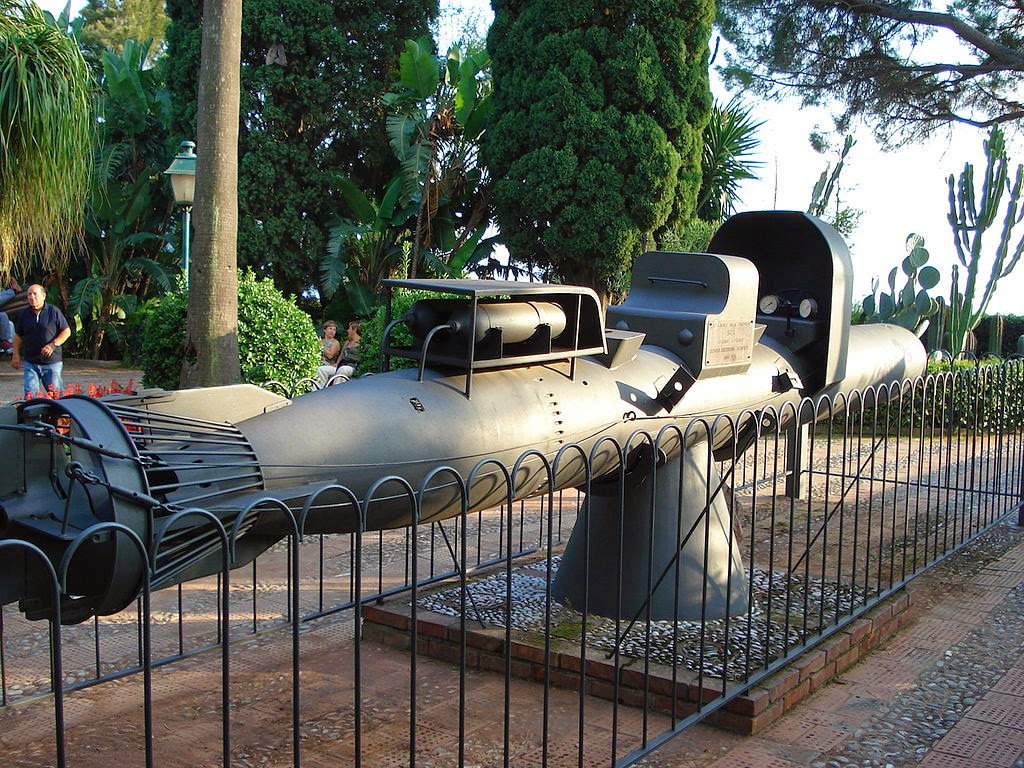They had no underwater breathing sets, and thus had to keep their heads above water to breathe. They were discovered and taken prisoner as they attempted to leave the harbour.
1 November 1918: Two men of the Regia Marina, Raffaele Paolucci and Raffaele Rossetti, in diving suits, rode a primitive manned torpedo (nicknamed Mignatta or "leech") into the Austro-Hungarian Navy base at Pola (Istria),
where they sank the Austrian battleship Viribus Unitis and the freighter Wien using limpet mines. They had no breathing sets and they had to keep their heads above water, and thus they were discovered and taken prisoner.

The pair resurrected the idea of Paolucci and Rossetti.
Human torpedo
Kaiten - torbedo
-----------------------------------------
In the 1920s, sport spearfishing without breathing apparatus became popular on the Mediterranean coast of France and Italy. This spurred the development of modern swimfins, diving masks and snorkels.
In the 1930s Italian sport spearfishermen began using industrial or submarine-escape oxygen rebreathers, starting scuba diving in Italy.
---------------------------------------
 The first human torpedo (the Italian Maiale) was electrically propelled, with two crewmen in diving suits riding astride. They steered the torpedo at slow speed to the enemy ship. The detachable warhead was then used as a limpet mine. They then rode the torpedo away.
The first human torpedo (the Italian Maiale) was electrically propelled, with two crewmen in diving suits riding astride. They steered the torpedo at slow speed to the enemy ship. The detachable warhead was then used as a limpet mine. They then rode the torpedo away.In operation, the Maiale torpedo was carried by another vessel (usually a normal submarine), and launched near the target. Most manned torpedo operations were at night and during the new moon to cut down the risk of being seen.
The idea was successfully applied by the Italian navy (Regia Marina) early in World War II and then copied by the British when they discovered the Italian operations.
The official Italian name for their craft was Siluro a Lenta Corsa (SLC or "Slow-running torpedo"), but the Italian operators nicknamed it Maiale (Italian for "pig"; plural maiali) because it was difficult to steer. The British copies were named "chariots".
A typical manned torpedo has a propeller and hydroplanes at the rear, side hydroplanes in front, and a control panel and controls for its front rider. It usually has two riders who sit facing forwards. It has navigation aids such as a compass, and nowadays modern aids such as sonar and GPS positioning and modulated ultrasound communications gear.
It may have an air (or other breathing gas) supply so its riders do not have to drain their own apparatus while they are riding it. In some the riders' seats are enclosed; in others the seats are open at the sides as in sitting astride a horse. The seat design includes room for the riders' swimfins (if used). There are flotation tanks (typically four: left fore, right fore, left aft, right aft), which can be flooded or blown empty to adjust buoyancy and attitude.
-----------------
1909: The British designer Commander Godfrey Herbert received a patent for a manned torpedo. During World War I, it was rejected by the War Office as impracticable and unsafe.








Japan had something like this in WW2, you would have to be crazy to ride in one of them
VastaaPoistaMorning, to my morning coffee table
PoistaOh, yes. Japan uses human torpedo against to U.S. ships.
Japan torpedos was mostly kamikaze torpedos, but not all.
Old movie, the okinawa sharks? tell this, but kamikaze-boat story
Moi.
PoistaI put this as a result my old memory.
(Italeri makes this sets)
This torpedo story is a very old and familiar story to me.
I read it sometime in the 1950s cartoon magazine / High-Exiting (= high-tension)
(British publishing house Fleetway Combat Picture Library)
The second report was the Burmese jungle war fighting
three men who fell, Kanga Smith, Blue Jones, Curly Gollins, officer stay safe
One newspaper had Wings (wings) and Battler Britton
(Air Ace Picture Library)
The fourth was an exciting space adventure
One story that was left was Sirius horrors planet werewolves
Imperial Japanese Navy Kaiten Type 1 Human Torpedo w/Transport Dolly (2) 1/72 Fine Molds
PoistaHi, Al
VastaaPoistaThanks to comment
These torpedo story found is also World War I book, which is a good book
My military play began this Torpedo story
I was something like this, and I was 7-8 years old and was a very hot summer
I Make modeling clay this kind and the two riders
but it melts into one heap...
Original and great subject, well illustrated...well done, once again!
VastaaPoistaHi, Phil
PoistaThank you for your very kind comment.
I have a lot of WW-2-themed books, and a great surprise has been
wikipedia texts are the same, but much more limited content.
Many the books images are same as in Wikipedia, or google search (natural reasons)